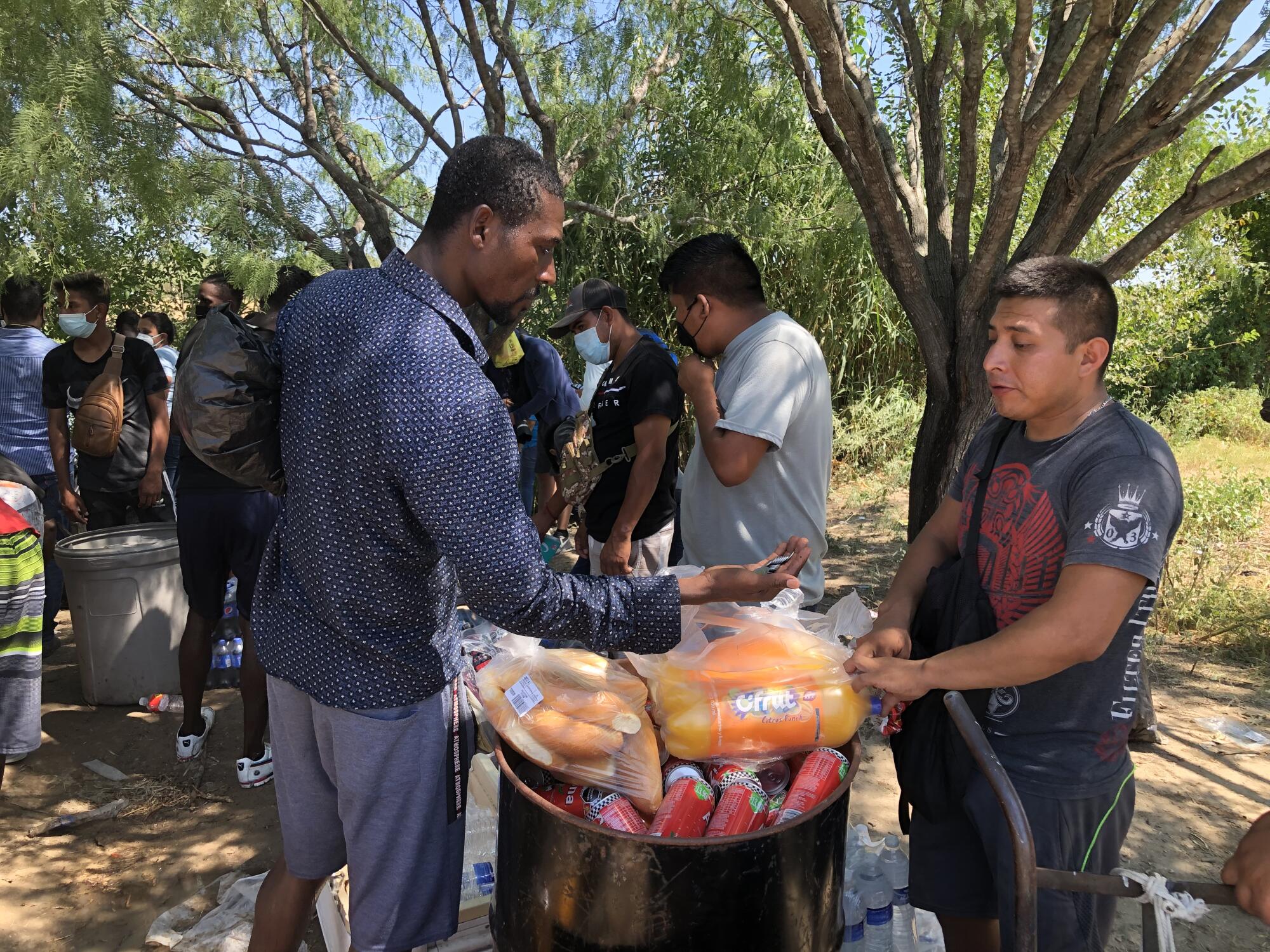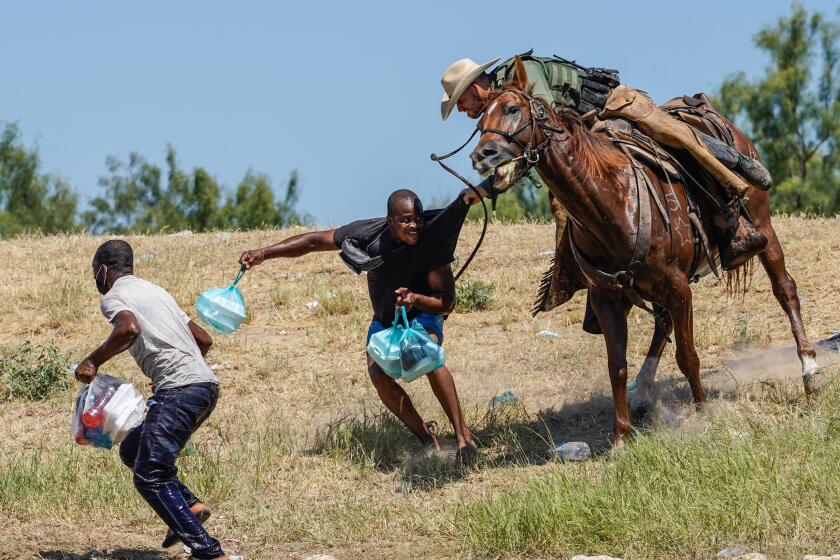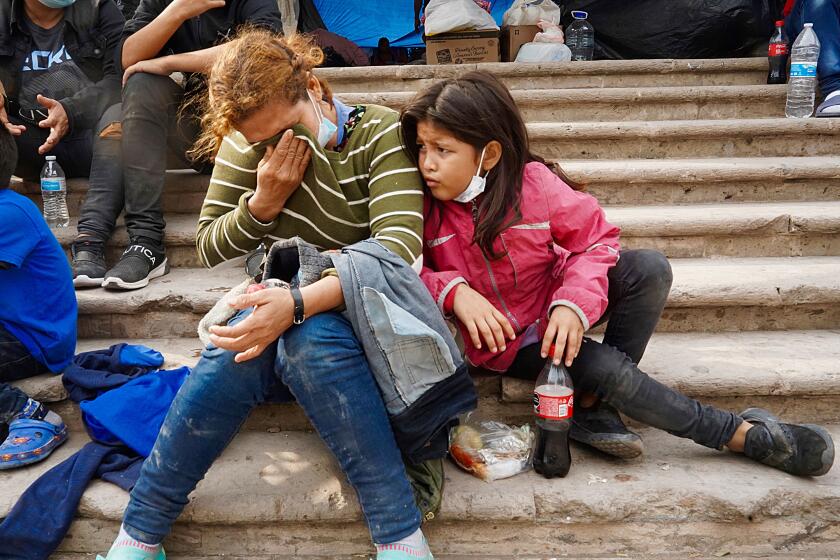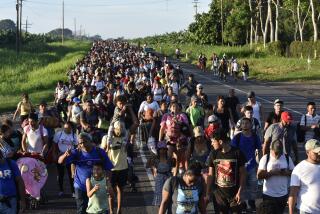
- Share via
CIUDAD ACUÑA, Mexico — The treacherous waters of the Rio Grande rushed by as Isnac Joseph admitted he didn’t know how to swim. But the 31-year-old father of a hungry 2-year-old son in the migrant border camp nevertheless braved the river — joining a daily pilgrimage of hundreds of other Haitians — leaving the U.S. side to buy food, water and other necessities in Mexico.
According to the migrants, they’ve been forced to traverse the river daily to buy food because they’re not allowed to cook in the camp and the U.S. has failed to provide any real sustenance. The camp has grown during the last week to more than 14,000.
Join our reporters for a live conversation about Haitian migrants at the border
At 1 p.m. PT on Tuesday, Sept. 21, Houston Bureau Chief Molly Hennessy-Fiske, Mexico City Bureau Chief Patrick J. McDonnell and Foreign and National Editor Jeffrey Fleishman will be live on Twitter Spaces discussing the Haitian migrants at the U.S./Mexico border.
Set a reminder here to listen in on the conversation.
On Monday morning, Texas state troopers parked along the U.S. side of the river looked on as migrants picked their way down the muddy banks toward Mexico, some toting babies. Many said the only food their families received at the camp each day was a sandwich, bottle of water and a few cookies.
Mostly men crossed the hazardous stretch of river, about half the length of a football field, because few at the camp knew how to swim.
Haitian migrants continue to pour into Texas. But hoping to avoid deportation, many decide to cross the Rio Grande back to Mexico.
“My child is hungry, but the water is fast. I’m afraid,” said Joseph, who was crossing to buy milk for his son.
“It’s a sacrifice,” said Makendi Charles, 29, who also didn’t know how to swim and crossed to get $300 that relatives in Haiti had sent to a bank so he could buy food for his wife and 3-year-old son. “I have to get something for my son because it’s so hot. He tells me, ‘Papa, my belly hurts and my nose, too.’ He has a cold, a cough.”
The migrants clung to a yellow rope strung across the river, teetering on river rocks and stumbling at times in the weeds. They were in a hurry. Temperatures have been rising above 100 degrees in the afternoons, taking a toll on pregnant women and children.

On Sunday, at least one woman at the camp passed out and had to be removed by National Guard troops. Children lay limp and listless in the arms of parents who said they couldn’t afford medicine from Mexican pharmacies. There’s no clinic at the camp.
Migrants also hurried to retrieve supplies Monday because they knew the Rio Grande would rise chest high by 4 p.m., with currents one man compared to an anaconda, squeezing as it sucks you under. On Sunday, a woman and baby were briefly swept underwater, according to several migrants who witnessed the close call. Both survived, they said.
Once in Acuña, Mexico, the migrants faced other obstacles. Many spoke Spanish, having spent years living in South America, but they stood out in the sleepy border town of about 160,000. Some complained of price gouging, not just by vendors on the riverbank, but also by taxi drivers and stores in town. Many had exhausted their savings paying for their journey north, which they said cost $5,000 to $11,000 per family.

The migrants formed lines outside El Dorado fried chicken, Aguas Frescas shops and the supermarkets. Enterprising locals wheeled carts of ice cream and iced drinks into the park near their informal crossing. Others parked in the fields near migrants’ already well-worn tracks to sell clothes and housewares out of their trunks, shouting prices in pesos.
“Food, chicken, 50!” a vendor shouted, and the man with the ice cream cart soon joined in, “Ice cream, 5!”
“Trash bags!” called a father and son.
“How much?” a migrant still wet from the river asked — 10 pesos, they replied. He bought several.
Hats cost 50 pesos, shorts 120.

“You’re robbing us!” Ismo Dilema complained before buying several bottles of orange soda for 20 pesos, about a dollar each.
Dilema, 44, a tall cook with a goatee and blue and white checked shirt, was broke. He had to borrow money to feed his wife and two children from a friend at the camp, carrying the cash across the river in a plastic bag.
“People are buying because they’re starving,” he said before climbing back down the muddy riverbank near others toting boxes of pizzas and rice.
The Border Patrol confronts massive, growing camp of Haitian migrants in Del Rio, Texas.
Mexican vendors said they were making a slim profit and running steep risks working amid the chaos, where tempers occasionally flared and Mexican police could crack down at any moment.
“We’re worried they could take things,” said vendor Andres Macario, 16, who had been selling drinks to the migrants since they arrived last week.
They prefer Coke and orange juice, he said — no tortillas.

Migrants said feeding their families daily at the camp costs at least 1,000 pesos, about $50; singles get by on about $20. Many returning to the camp Monday afternoon said they were running out of cash and had contacted relatives in the U.S. and Haiti for help.
The migrants had heard about the U.S. flying people back to Haiti last week, and wondered aloud whether they, too, would be expelled if they stayed at the camp.
Homeland Security Secretary Alejandro N. Mayorkas, in Del Rio on Monday, said most of the Haitians removed from the encampment have been expelled under the authority of Title 42, a pandemic policy started by President Trump and continued by President Biden.

Haitian migrants held at the camp said U.S. immigration officials had issued them numbered tickets. When their numbers were called, officials told migrants they would be reunited with relatives in the U.S. even as they were zip cuffed and loaded into buses to be expelled.
“They say they’re going to send you to your family in the U.S. It’s a lie,” said Stanley Moise, 25, a fish store worker in a black Puma cap, Adidas T-shirt and shorts who said he saw fellow migrants loaded onto buses.
A pathway to citizenship cannot be included in the Democrats’ reconciliation infrastructure bill, a key Senate aide has ruled.
Moise spent his last pesos Monday on six chicken dinners and water for his family, including 2-year-old daughter Isadora.
“No person in 2021 should live in a situation like this. Each day is worse,” he said.
He planned to cross again Tuesday to get relatives to send money for food because, he said, “I have to help my family survive.”

Some Haitians said they were considering moving their families from the camp to a shelter in Acuña on Monday, afraid that if they didn’t, they would be expelled.
“They would be better off there. The buses are coming to deport us at any moment,” said construction worker Gabriel Valdeim, 32, as he carried water, yogurt, fruit ices and two chicken dinners back to his wife and 2-year-old son.
He said U.S. immigration officials at the camp called his ticket number Monday, 409, but his family didn’t board the bus.
“I’m afraid of being sent back to my country. It’s getting worse every day and America knows it, the politicians know it,” he said.
He had 200 pesos left, about $10. On Tuesday, he hoped to contact his aunt in Louisville, Ky., or an uncle in Miami to ask for more.
A federal judge on Thursday gave the government two weeks to halt the use of Title 42 to expel migrants with children who are apprehended at the U.S.-Mexico border.
Immigrant advocacy groups and some lawmakers have objected to how the Border Patrol has treated migrants at the camp. Monday afternoon, a U.S. Customs and Border Protection boat zoomed up to the crossing, but didn’t stop the migrants. Eight Border Patrol agents arrived on horseback and stood guard as others pulled the boat up a ramp and away. They watched as migrants carried supplies to the Mexican riverbank, some balanced on their heads, then climbed down into the water and waded across. Then they left.
Still, migrants said they worried U.S. or Mexican officials would close the crossing this week, after they blocked another shallower spot atop a dam farther west over the weekend. As 4 p.m. approached, they hustled back.
Construction worker Frantzo Darios carried bags loaded with all he could afford for his wife and 2-year-old son Juan: Two meals of chicken, rice and French fries, cookies and juice. He said two months ago they left Chile, where like many at the camp they had lived for four years, after being threatened by gangs. The journey cost his family $8,000. He had hoped the Biden administration would allow them to join relatives in Wellington, Fla.
“Now, with the deportations they’re doing, there’s no hope,” said Darios, 35.
He had 400 pesos left. His son has a cough, but he can’t afford medicine, and there’s no clinic in the camp. Did he plan to cross again Tuesday, and what would he do if U.S. or Mexican officials closed the crossing?
“I’m not sure,” he said, “I’m not sure of anything.”
More to Read
Sign up for Essential California
The most important California stories and recommendations in your inbox every morning.
You may occasionally receive promotional content from the Los Angeles Times.
















